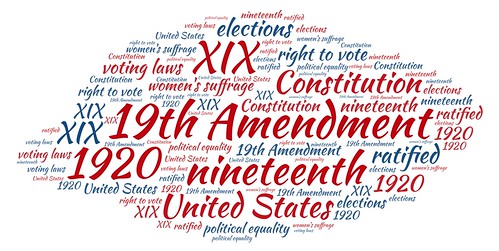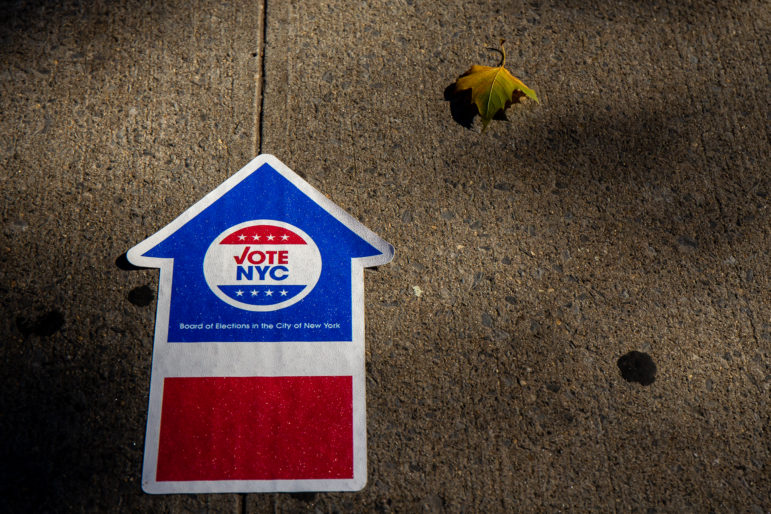Opinion: 103 Years After Women’s Suffrage, We’re Still Fighting for the Power of Our Vote
19th Amendment #19thAmendment

“We still see some of the same voting suppression tactics due to the systemic racism embedded in our voting system. Black women and communities of color continue to fight for the right to vote, work that is especially important as different states throughout the country are actively advancing regressive legislation that will end that right for many.”

Adi Talwar
A marker directs voters to their poll site on Election Day  CityViews are readers’ opinions, not those of City Limits. Add your voice today!
CityViews are readers’ opinions, not those of City Limits. Add your voice today!
Aug. 18 marks the 103rd anniversary of the passage of 19th amendment—a revolutionary change to the U.S. Constitution that granted women the right to vote. The movement to advance the 19th amendment was led by Black and white suffragists and slavery abolitionists and ultimately generated political support after years of organizing, but this historical landmark is hardly a celebration. Despite the rights granted by the 19th amendment, Black, Indigenous, and immigrant women and men continued to be disenfranchised, a legacy that continues to impact marginalized communities today.
The passage of the 19th amendment and the fight for voting rights brought about a backlash of voter suppression tactics that specifically targeted Black and immigrant people. These tactics included arbitrary literacy tests, long and invasive registration forms, interpretation tests, poll taxes and outright violence. It wasn’t until 45 years after the 19th Amendment became law, with the passage of the Voting Rights Act, that all people were free to vote.
But even now we still see some of the same voting suppression tactics due to the systemic racism embedded in our voting system. Black women and communities of color continue to fight for the right to vote, work that is especially important as different states throughout the country are actively advancing regressive legislation that will end that right for many.
But the fight for women’s right to vote also brought about the beginning of the American Equal Rights Association (AERA). Founded by Frederick Douglas and white suffragists, the goal of the association was to guarantee comprehensive voting rights legislation for both women and Black people. Despite its progressive inception, the AERA essentially left out Black women, and today our fight for Black women’s autonomy is not that distant.
The Equal Rights Amendment (ERA) is intended to prohibit discrimination by the government based on a person’s ethnicity, national origin, age, disability, and sex—including their sexual orientation, gender identity, gender expression, pregnancy and pregnancy outcomes. New York’s constitution currently does not protect these marginalized identities. The fight for the passage of the 19th amendment might have been very flawed, but it ignited our spark to demand inclusive and fair legislation be embedded into our legal systems.
The shameless oppression of our reproductive freedom that has taken place over the past year might echo the forced oppression of our voting rights back in the 1920s. But there is no denying that given our dire political climate, enforcing our right to vote is more important now than ever. As of 2022 an estimated 4.6 million people across the nation (about twice the population of New Mexico) are disenfranchised from voting due to a felony conviction, a law that dates back to the post-Reconstruction era. Amongst that group, 1 in 19 Black people of voting age are disenfranchised, a rate 3.5 times higher than that of non-Black Americans, and approximately 1 million women (about the population of Delaware) are disenfranchised from voting, comprising over one-fifth of the total disenfranchised population.
Back then, Black women’s power and voices might have been overshadow by movements that only advanced white women’s bodily autonomy and extended them the right to vote, but today we can use the power of our vote to fight against voter suppression for disenfranchised populations and to have the legislative changes we want, such as the ERA, embedded into our state constitution, so we can ensure the mistakes of the past are never repeated.
This November and in future elections to come, we can use our votes to win freedoms we didn’t think possible in the 1920s. We can use our vote to elect reproductive rights champions to every level of office—leaders who will advocate for the passage of the reproductive freedom and equity fund, a hospital transparency bill, and finally push forward a comprehensive sex education bill for our youth. Our votes can say never again.
National Voter Registration Day is happening on Sept. 19. The deadline to register for the November elections is Oct. 28. To register to vote or to update your registration information click here, to find a voting place near you click here.
Maryam Mohammed-Miller is the director of government relations at Planned Parenthood of Greater New York.